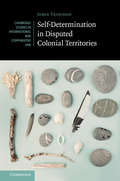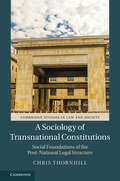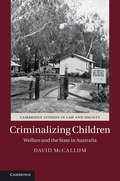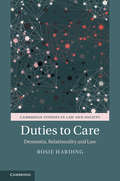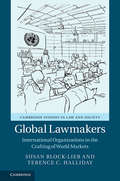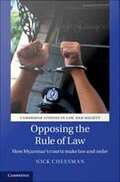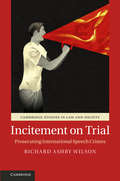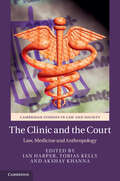- Table View
- List View
Cambridge Studies in International and Comparative Law: Self-Determination in Disputed Colonial Territories (Cambridge Studies in International and Comparative Law #134)
by Jamie TrinidadSelf-Determination in Disputed Colonial Territories addresses the relationship between self-determination and territorial integrity in some of the most difficult decolonization cases in international law. It investigates historical cases, such as Hong Kong and the French and Portuguese territories in India, as well as cases that remain very much alive today, such as the Western Sahara, Gibraltar, the Falkland Islands and the Chagos Islands. This book provides a comprehensive analysis of colonial territories that are, or have been, the subject of adverse third-party claims, invariably by their neighbouring states. Self-Determination in Disputed Colonial Territories takes a contextual, historical approach to mapping the existing law and will be of interest to international lawyers, as well as scholars of international relations and students of the history of decolonization.
Cambridge Studies in International and Comparative Law: Taking Economic, Social and Cultural Rights Seriously in International Criminal Law
by Evelyne SchmidIs the neglect of economic, social and cultural abuses in international criminal law a problem of positive international law or the result of choices made by lawyers involved in mechanisms such as criminal prosecutions or truth commissions? Evelyne Schmid explores this question via an assessment of the relationship between violations of economic, social and cultural rights and international crimes. Based on a thorough examination of the elements of international crimes, she demonstrates how a situation can simultaneously be described as a violation of economic, social and cultural rights and as an international crime. Against the background of the emerging debates on selectivity in international criminal law and the role of socio-economic and cultural abuses in transitional justice, she argues that international crimes overlapping with violations of economic, social and cultural rights deserve to be taken seriously, for much the same reasons as other international crimes.
Cambridge Studies in International and Comparative Law: The Doctrine of Odious Debt in International Law
by Jeff KingAccording to the doctrine of odious debt, loans which are knowingly provided to subjugate or defraud the population of a debtor state are not legally binding against that state under international law. Breaking with widespread scepticism, this groundbreaking book reaffirms the original doctrine through a meticulous and definitive examination of state practice and legal history. It restates the doctrine by introducing a new classification of odious debts and defines 'odiousness' by reference to the current, much more determinate and litigated framework of existing public international law. Acknowledging that much of sovereign debt is now governed by the private law of New York and England, Jeff King explores how 'odious debts' in international law should also be regarded as contrary to public policy in private law. This book is essential reading for practising lawyers, scholars, and development and human rights workers.
Cambridge Studies in International and Comparative Law: The Formation and Identification of Rules of Customary International Law in International Investment Law
by Patrick DumberryRules of customary international law provide basic legal protections to foreign investors doing business abroad. These rules remain of fundamental importance today despite the growing number of investment treaties containing substantive investment protection. In this book, Patrick Dumberry provides a comprehensive analysis of the phenomenon of custom in the field of international investment law. He analyses two fundamental questions: how customary rules are created in this field and how they can be identified. The book examines the types of manifestation of State practice which should be considered as relevant evidence for the formation of customary rules, and to what extent they are different from those existing under general international law. The book also analyses the concept of States' opinio juris in investment arbitration. Offering guidance to actors called upon to apply customary rules in concrete cases, this book will be of significant importance to those involved in investment arbitration.
Cambridge Studies in Islamic Civilization: Sexual Violation in Islamic Law
by Hina AzamThis book provides a detailed analysis of Islamic juristic writings on the topic of rape and argues that classical Islamic jurisprudence contained nuanced, substantially divergent doctrines of sexual violation as a punishable crime. The work centers on legal discourses of the first six centuries of Islam, the period during which these discourses reached their classical forms, and chronicles the juristic conflict over whether or not to provide monetary compensation to victims. Along with tracing the emergence and development of this conflict over time, Hina Azam explains evidentiary ramifications of each of the two competing positions, which are examined through debates between the Ḥanafī and Mālikī schools of law. This study examines several critical themes in Islamic law, such as the relationship between sexuality and property, the tension between divine rights and personal rights in sex crimes, and justifications of victim's rights afforded by the two competing doctrines.
Cambridge Studies in Islamic Civilization: The Economics of Ottoman Justice
by Metin Coşgel Boğaç ErgeneDuring the seventeenth and eighteenth centuries, the Ottoman Empire endured long periods of warfare, facing intense financial pressures and new international mercantile and monetary trends. The Empire also experienced major political-administrative restructuring and socioeconomic transformations. In the context of this tumultuous change, The Economics of Ottoman Justice examines Ottoman legal practices and the sharia court's operations to reflect on the judicial system and provincial relationships. Metin Coşgel and Boğa#65533; Ergene provide a systematic depiction of socio-legal interactions, identifying how different social, economic, gender and religious groups used the court, how they settled their disputes, and which factors contributed to their success at trial. Using an economic approach, Coşgel and Ergene offer rare insights into the role of power differences in judicial interactions, and into the reproduction of communal hierarchies in court, and demonstrate how court use patterns changed over time.
Cambridge Studies in Law And Society: Criminal Defense in China
by Halliday Sida Liu Terence C.Criminal Defense in China studies empirically the everyday work and political mobilization of defense lawyers in China. It builds upon 329 interviews across China, and other social science methods, to investigate and analyze the interweaving of politics and practice in five segments of the practicing criminal defense bar in China from 2005 to 2015. This book is the first to examine everyday criminal defense work in China as a political project. The authors engage extensive scholarship on lawyers and political liberalism across the world, from seventeenth-century Europe to late twentieth-century Korea and Taiwan, drawing on theoretical propositions from this body of theory to examine the strategies and constraints of lawyer mobilization in China. The book brings a fresh perspective through its focus on everyday work and ordinary lawyering in an authoritarian context and raises searching questions about law and lawyers, politics and society, in China's uncertain future.
Cambridge Studies in Law and Society: A Sociology of Transnational Constitutions (Cambridge Studies In Law And Society Ser.)
by Chris ThornhillThis volume focuses on the rise of transnational constitutional laws, primarily created by the interaction between national and international courts and by the domestic transformation of international law. Through detailed analysis of patterns of institutional formation at key historical junctures in a number of national societies, it examines the social processes that have locked national states into an increasingly transnational constitutional order, and it explains how the growth of global constitutional norms has provided a stabilizing framework for the functions of state institutions. The book adopts a distinctive historical-sociological approach to these questions, examining the deep continuities between national constitutional law and contemporary models of global law. The volume makes an important contribution to the sociology of constitutional law, to the sociology of post-national legal processes, and to the sociology of human rights law. This title is also available as Open Access.
Cambridge Studies in Law and Society: Buried in the Heart
by Erin BainesIn Buried in the Heart, Erin Baines explores the political agency of women abducted as children by the Lord's Resistance Army in northern Uganda, forced to marry its commanders, and to bear their children. Introducing the concept of complex victimhood, she argues that abducted women were not passive victims, but navigated complex social and political worlds that were life inside the violent armed group. Exploring the life stories of thirty women, Baines considers the possibilities of storytelling to reclaim one's sense of self and relations to others, and to generate political judgement after mass violence. Buried in the Heart moves beyond victim and perpetrator frameworks prevalent in the field of transitional justice, shifting the attention to stories of living through mass violence and the possibilities of remaking communities after it. The book contributes to an overlooked aspect of international justice: women's political agency during wartime.
Cambridge Studies in Law and Society: China and Islam
by Matthew S. ErieChina and Islam examines the intersection of two critical issues of the contemporary world: Islamic revival and an assertive China, questioning the assumption that Islamic law is incompatible with state law. It finds that both Hui and the Party-State invoke, interpret, and make arguments based on Islamic law, a minjian (unofficial) law in China, to pursue their respective visions of 'the good'. Based on fieldwork in Linxia, 'China's Little Mecca', this study follows Hui clerics, youthful translators on the 'New Silk Road', female educators who reform traditional madrasas, and Party cadres as they reconcile Islamic and socialist laws in the course of the everyday. The first study of Islamic law in China and one of the first ethnographic accounts of law in postsocialist China, China and Islam unsettles unidimensional perceptions of extremist Islam and authoritarian China through Hui minjian practices of law.
Cambridge Studies in Law and Society: Contesting Immigration Policy in Court
by Leila KawarWhat difference does law make in immigration policymaking? Since the 1970s, networks of progressive attorneys in both the US and France have attempted to use litigation to assert rights for non-citizens. Yet judicial engagement - while numerically voluminous - remains doctrinally curtailed. This study offers new insights into the constitutive role of law in immigration policymaking by focusing on the legal frames, narratives, and performances forged through action in court. Challenging the conventional wisdom that 'cause litigation' has little long-term impact on policymaking unless it produces broad rights-protective principles, this book shows that legal contestation can have important radiating effects on policy by reshaping how political actors approach immigration issues. Based on extensive fieldwork in the United States and France, this book explores the paths by which litigation has effected policy change in two paradigmatically different national contexts.
Cambridge Studies in Law and Society: Contractual Knowledge
by Grégoire Mallard Jérôme SgardContractual Knowledge: One Hundred Years of Legal Experimentation in Global Markets, edited by Grégoire Mallard and Jérôme Sgard, extends the scholarship of law and globalization in two important directions. First, it provides a unique genealogy of global economic governance by explaining the transition from English law to one where global exchanges are primarily governed by international, multilateral, and finally, transnational legal orders. Second, rather than focusing on macro-political organizations, like the League of Nations or the International Monetary Fund, the book examines elements of contracts, including how and by whom they were designed and exactly who (experts, courts, arbitrators, and international organizations) interpreted, upheld, and established the legal validity of these contracts. By exploring such micro-level aspects of market exchanges, this collection unveils the contractual knowledge that led to the globalization of markets over the last century.
Cambridge Studies in Law and Society: Criminalizing Children
by David McCallumIncarceration of children is rising rapidly throughout of Australia, with indigenous children most at risk of imprisonment. Indigenous and non-indigenous children have been subject to detention in both welfare and justice systems in Australian states and territories since colonization. Countless governments and human rights enquiries have attempted to address the problem of the increasing criminalization of children, with little success. David McCallum traces the history of 'problem children' over several decades, demonstrating that the categories of neglected and offending children are both linked to similar kinds of governing. Institutions and encampments have historically played a significant role in contributing to the social problems of today. This book also takes a theoretical perspective, tracking parallel developments within the human sciences of childhood and theories of race. Applying a social theoretical analysis of these events and the changing rationalities of governing, McCallum challenges our assumptions about how law and governance of children leads to their criminalization and incarceration.
Cambridge Studies in Law and Society: Dementia, Relationality and Law (Cambridge Studies in Law and Society)
by Rosie HardingThe world of dementia care can be a difficult one for carers to navigate, posing new challenges at every stage from diagnosis to end of life. In her ground-breaking investigation, rooted in original empirical data, Rosie Harding explores the regulatory and legal dimensions of caring for a person with dementia. By exploring carers' experiences of dementia care, she critiques the limitations of current approaches to health and social care regulation. This socio-legal work is a new contribution to the study of feminist care ethics, relationality, and vulnerability theory. Duties to Care argues that by understanding the relational contexts that shape everyday experiences of regulatory structures, we will better understand where law is operating to support carers, and where it adds to the difficulties they experience. Ultimately, the challenges that dementia poses will be addressed only if we find solutions that take account of the relationality of life, dementia, and law.
Cambridge Studies in Law and Society: Diversity in Practice
by Headworth, Spencer and Nelson, Robert L. and Dinovitzer, Ronit and Wilkins, David B. Spencer Headworth Robert L. Nelson Ronit Dinovitzer David B. WilkinsExpressions of support for diversity are nearly ubiquitous among contemporary law firms and corporations. Organizations back these rhetorical commitments with dedicated diversity staff and various diversity and inclusion initiatives. Yet, the goal of proportionate representation for people of color and women remains unrealized. Members of historically underrepresented groups remain seriously disadvantaged in professional training and work environments that white, upper-class men continue to dominate. While many professional labor markets manifest patterns of demographic inequality, these patterns are particularly pronounced in the law and elite segments of many professions. Diversity in Practice analyzes the disconnect between expressed commitments to diversity and practical achievements, revealing the often obscure systemic causes that drive persistent professional inequalities. These original contributions build on existing literature and forge new paths in explaining enduring patterns of stratification in professional careers. These more realistic assessments provide opportunities to move beyond mere rhetoric to something approaching diversity in practice.
Cambridge Studies in Law and Society: Indigeneity and Legal Pluralism in India
by Pooja ParmarAs calls for reparations to indigenous peoples grow on every continent, issues around resource extraction and dispossession raise complex legal questions. What do these disputes mean to those affected? How do the narratives of indigenous people, legal professionals, and the media intersect? In this richly layered and nuanced account, Pooja Parmar focuses on indigeneity in the widely publicized controversy over a Coca-Cola bottling facility in Kerala, India. Juxtaposing popular, legal, and Adivasi narratives, Parmar examines how meanings are gained and lost through translation of complex claims into the languages of social movements and formal legal systems. Included are perspectives of the diverse range of actors involved, based on interviews with members of Adivasi communities, social activists, bureaucrats, politicians, lawyers, and judges. Presented in clear, accessible prose, Parmar's account of translation enriches debates in the fields of legal pluralism, indigeneity, and development.
Cambridge Studies in Law and Society: International Organizations in the Crafting of World Markets (Cambridge Studies in Law and Society)
by Susan Halliday Terence C. Block-LiebGlobal lawmaking by international organizations holds the potential for enormous influence over world trade and national economies. Representatives from states, industries, and professions produce laws for worldwide adoption in an effort to alter state lawmaking and commercial behaviors, whether of giant multi-national corporations or micro, small and medium-sized businesses. Who makes that law and who benefits affects all states and all market players. Global Lawmakers offers the first extensive empirical study of commercial lawmaking within the United Nations. It shows who makes law for the world, how they make it, and who comes out ahead. Using extensive and unique data, the book investigates three episodes of lawmaking between the late 1990s and 2012. Through its original socio-legal orientation, it reveals dynamics of competition, cooperation and competitive cooperation within and between international organizations, including the UN, World Bank, IMF and UNIDROIT, as these IOs craft international laws. Global Lawmakers proposes an original theory of international organizations that seek to construct transnational legal orders within social ecologies of lawmaking. The book concludes with an appraisal of creative global governance by the UN in international commerce over the past fifty years and examines prospective challenges for the twenty-first century.
Cambridge Studies in Law and Society: Investing in Authoritarian Rule
by Anuradha ChakravartyThis book shows how Rwanda's transitional courts that tried genocide crimes - the gacaca - produced social complicity and cemented authoritarian rule. It is unique for its in-depth investigation of the courts' legal operations: confessions, denunciation, and lay judging, and shows how targeted incentives such as grants of clemency, opportunities for private gain, and career advancement drew the masses into the orbit of the ethnic minority-dominated regime. Using previously untapped data, it illustrates how a decade of mass trials constructed a tacit patronage-driven relationship in which the interests of the citizenry became tied to the authoritarian elite that had discretionary power to grant or withdraw those benefits at will. The operation of law in individual behavior and authoritarian control presented in this volume will be of use to students and scholars in the social sciences, and practitioners interested in criminal law and transitional justice.
Cambridge Studies in Law and Society: Iraq and the Crimes of Aggressive War
by John HaganFrom the torture of detainees at Abu Ghraib to unnecessary military attacks on civilians, this book is an account of the violations of international criminal law committed during the United States invasion of Iraq. Taking stock of the entire war, it uniquely documents the overestimation of the successes and underestimation of the failings of the Surge and Awakening policies. The authors show how an initial cynical framing of the American war led to the creation of a new Shia-dominated Iraq state, which in turn provoked powerful feelings of legal cynicism among Iraqis, especially the Sunni. The predictable result was a resilient Sunni insurgency that re-emerged in the violent aftermath of the 2011 withdrawal. Examining more than a decade of evidence, this book makes a powerful case that the American war in Iraq constituted a criminal war of aggression.
Cambridge Studies in Law and Society: Opposing the Rule of Law
by Nick CheesmanThe rule of law is a political ideal today endorsed and promoted worldwide. Or is it? In a significant contribution to the field, Nick Cheesman argues that Myanmar is a country in which the rule of law is 'lexically present but semantically absent'. Charting ideas and practices from British colonial rule through military dictatorship to the present day, Cheesman calls upon political and legal theory to explain how and why institutions animated by a concern for law and order oppose the rule of law. Empirically grounded in both Burmese and English sources, including criminal trial records and wide ranging official documents, Opposing the Rule of Law offers the first significant study of courts in contemporary Myanmar. It sheds new light on the politics of courts during dark times and sharply illuminates the tension between the demand for law and the imperatives of order.
Cambridge Studies in Law and Society: Palaces of Hope
by Ronald Niezen Maria SapignoliThis volume assembles in one place the work of scholars who are making key contributions to a new approach to the United Nations, and to global organizations and international law more generally. Anthropology has in recent years taken on global organizations as a legitimate source of its subject matter. The research that is being done in this field gives a human face to these world-reforming institutions. Palaces of Hope demonstrates that these institutions are not monolithic or uniform, even though loosely connected by a common organizational network. They vary above all in their powers and forms of public engagement. Yet there are common threads that run through the studies included here: the actions of global institutions in practice, everyday forms of hope and their frustration, and the will to improve confronted with the realities of nationalism, neoliberalism, and the structures of international power.
Cambridge Studies in Law and Society: Prosecuting International Speech Crimes (Cambridge Studies in Law and Society)
by Wilson Richard AshbyInternational and national armed conflicts are usually preceded by a media campaign in which public figures foment ethnic, national, racial or religious hatred, inciting listeners to acts of violence. Incitement on Trial evaluates the efforts of international criminal tribunals to hold such inciters criminally responsible. This is an unsettled area of international criminal law, and prosecutors have often struggled to demonstrate a causal connection between speech acts and subsequent crimes. This book identifies 'revenge speech' as the type of rhetoric with the greatest effects on empathy and tolerance for violence. Wilson argues that inciting speech should be handled under the preventative doctrine of inchoate crimes, but that once international crimes have been committed, then ordering and complicity are the most appropriate forms of criminal liability. Based in extensive original research, this book proposes an evidence-based risk assessment model for monitoring political speech.
Cambridge Studies in Law and Society: Shifting Legal Visions
by González-Ocantos Ezequiel A.What explains the success of criminal prosecutions against former Latin American officials accused of human rights violations? Why did some judiciaries evolve from unresponsive bureaucracies into protectors of victim rights? Using a theory of judicial action inspired by sociological institutionalism, this book argues that this was the result of deep transformations in the legal preferences of judges and prosecutors. Judicial actors discarded long-standing positivist legal criteria, historically protective of conservative interests, and embraced doctrines grounded in international human rights law, which made possible innovative readings of constitutions and criminal codes. Litigants were responsible for this shift in legal visions by activating informal mechanisms of ideational change and providing the skills necessary to deal with complex and unusual cases. Through an in-depth exploration of the interactions between judges, prosecutors and human rights lawyers in three countries, the book asks how changing ideas about the law and standards of adjudication condition the exercise of judicial power.
Cambridge Studies in Law and Society: The Clinic and the Court
by Tobias Kelly Ian Harper Harper, Ian and Kelly, Tobias and Khanna, Akshay Akshay KhannaLaw and medicine can be caught in a tight embrace. They both play a central role in the politics of harm, making decisions regarding what counts as injury and what might be the most suitable forms of redress or remedy. But where do law and medicine converge and diverge in their responses to and understandings of harm and suffering? Using empirical case studies from Europe, the Americas and Africa, The Clinic and the Court brings together leading medical and legal anthropologists to explore this question.
Cambridge Studies in Religion, Philosophy, and Society: Ethics and Religion
by Harry J. GenslerMany people question whether God is the source of morality. Under divine command theory, God's will creates the moral order, and therefore ethical truths are true because of God's will. Under natural law, on the other hand, some ethical truths do not depend on God's will, and yet perhaps they depend on his reason or creation. Ethics and Religion develops strong, defensible, and original versions of both divine command theory and natural law. The book also discusses ethics and atheism: how atheists object on ethical grounds to belief in God and how they view ethics. The book defends belief in God from criticisms and analyzes related concepts, such as practical reason, the golden rule, ethics and evolution, the problem of evil, and the fine-tuning argument.
